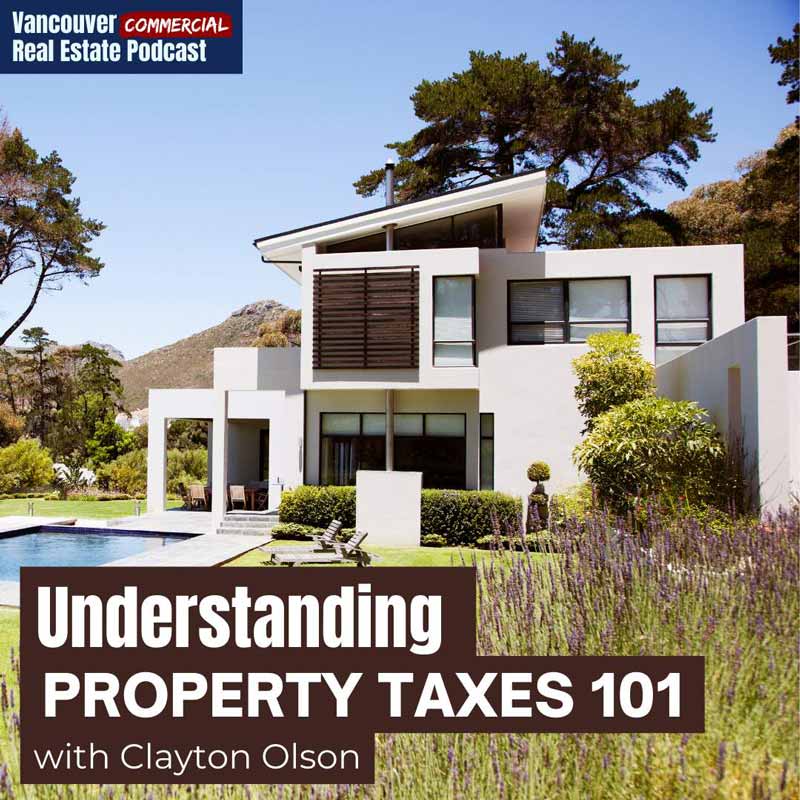
Powered by RedCircle
Ever wonder why or even how your property taxes go up every year? This week, Cory and Matt welcome Clayton Olson of Altus Group to discuss the metrics behind understanding your commercial property taxes. Although in most cases, your commercial property taxes are passed onto your tenant through a true triple net lease, these rising costs have a direct impact on your tenant's ability to pay their rent.
Clayton walks us through how these costs are calculated, why they increase, and what you can do about it if you disagree with your tax amount. If you own commercial property, this is another episode you don't want to miss.
Who is Clayton Olson?
I’m a real estate appraiser by trade and spent the first 11 years of my career in appraisal roles with BC Assessment. In 2022, I decided to make the jump to the private world and joined Altus Group as an Associate Director and property tax consultant. I work with clients to help them navigate the property tax process in BC.
Personally, I grew up in Kamloops and did my undergrad up there. I’ve been living in Vancouver for the last 12 years.
Does BC Assessment always get it right?
BC Assessment is assessing over two million properties every year. So you have to expect they’re going to miss something.
A common misconception is that assessments are always too low. But when the assessments come out in January, they’re actually a reflection of the market from July of the previous year. So by the time your assessment comes out, it’s already six months dated. In a fast moving market like Vancouver, that can be a big difference.
With commercial properties, every property is different and there are so many complexities. It would be impossible for BC Assessment to get it perfectly right with every commercial property.
How do commercial property taxes work?
Assessments come out every year at the beginning of January, giving you the market value of your property as of July 1st of the previous year. You can then go through an appeal process, if you choose. Once the assessment is finalized, it’s sent to the municipality. Then the municipality comes up with their tax rate, aka mill rate, and applies that to the assessed value.
Just because your assessment goes up doesn’t mean your taxes are going to go up. It’s more important to look at what your assessment is doing compared to similar properties.
Tax rates are based on a municipality’s budget and it’s always a balancing act.
Is there a relationship between the property taxes for commercial real estate and the property taxes for residential real estate?
It varies by municipality, their population base and how many residential vs commercial properties are within the municipality. In a typical situation, a residential real estate tax rate is 4-5 per $1000 of assessed value and a commercial tax rate is 10-25. It’s usually 7-8% higher for a commercial property, but can be up to double as much.
For properties that sell for a lot more than their assessed value, what does BC Assessment do?
At the end of the day, the assessments are based on market value. If a property sells for way over its assessed value, BC Assessment has to determine why. That’s why it’s so important to understand your assessment value.
What is the appeals process with BC Assessment?
Property owners have the right to appeal their assessment by January 31st of every year, after receiving their assessment on January 1st. The first level of appeal is with the Property Assessment Review Panel. This panel runs through February and March and allows the opportunity for tribunal hearings.
If you still disagree with the assessed value after your first appeal, you can make a second appeal to the Property Assessment Appeal Board. This is a more in-depth process. A case manager will guide the mediation process through the end of the year.
How are values assessed in commercial real estate?
With a commercial real estate property assessment, you’re not just looking at the market value. You’re also looking at expenses, cap rates, vacancy rates, etc.
75% of the appeals we move forward with are based on equity – it’s a matter of fairness. You have to be treated in the same way as other properties similar to yours.
We also look at the tax classification of your property. Each tax classification will have a different tax rate and they can differ quite a bit. The tax classification is based on the use of the property.
Is there a reason why anyone would want to appeal to increase the value of their commercial property assessment?
Not really. We see this more on the residential side. If a residential owner wants to sell their property, they may want a higher assessment because they think it will impact their sale price. But it’s not something we see on the commercial side.
Is there a negative impact to appealing your BC assessment?
At Altus Group, we do a cost-benefit analysis with our clients before starting the appeal process. There’s always a chance that the assessor will seek a higher value, so we want to manage that risk.
During an appeal with BC Assessment, what is being looked at?
It depends on the type of property. For an income producing property, you’ll start by looking at the rent. BC Assessment is trying to establish a net operating income using market rent. So you can compare the market rent in the area with the rents your property is generating. You also want to factor in the vacancy rate and cap rates for your property.
With vacant land, you’re looking at servicing costs and whatever you have to do to develop that land. There’s a lot of complexity to commercial property assessments.
If your neighbour sells their property for a high price, would that impact your assessment and result in higher property taxes for you?
If it’s a market transaction, I would be concerned that your assessed value is going up. On one hand, it’s good news that your property is worth more. But it likely results in higher taxes.
At the end of the day, it comes down to the fundamentals of the sale. Was the sale based on speculation or market values? One sale doesn’t necessarily make a market but if you have a few similarly high sales, I would expect your property taxes to be increasing.
If commercial property taxes are passed onto the tenant, why should the owner care?
The owner should care about property taxes because if the triple net costs to a tenant go up too dramatically, that tenant may not be able to afford their lease and have to leave. The landlord won’t receive rent, will have the costs of re-tenanting the property and may not be able to find a new tenant to fill the vacancy.
Can a tenant appeal a BC Assessment?
Anyone in BC can appeal the assessment for any property. So yes, tenants can reach out and appeal the property tax. We see that all the time and regularly act on behalf of tenants at Altus Group.
Do people ever appeal their neighbours’ assessments after a big sale?
We have seen appeals when a group of owners react to a sale in their area. And we’ve gone forward representing a group of owners. It won’t do you much good to just appeal your neighbour’s assessment but you can try to find out more about the deal.
How do clients work with Altus Group?
We try to work on a turn-key basis. If we take in a client, we will be reviewing all of their property assessments on a yearly basis. We’ll make recommendations on which assessments we think they should appeal.
If they choose to appeal, we’ll handle all of the litigation, communication and whatever else comes along.
We have different payment options at Altus Group. Some clients pay us on a fee-for-service basis and pay us an hourly rate for a review of their assessments. Other clients pay us on a contingency basis, based on tax savings achieved. It’s a pretty even mix.
Will BC property assessments be going up or down when they arrive in January 2023?
It seems like things are slowing down in terms of sales, which may create some opportunity with assessments. If there’s less comparable evidence, it’s harder to justify the assessment in place. But it’s market-specific. Industrial real estate continues to go through the roof with high values, which will result in high taxes.
Find out more: altusgroup.com & Clayton A. Olson, RI on LinkedIn
For all the curious minds interested in commercial real estate investing, grab a coffee and pull up a chair because we have exclusive stories and tips from commercial real estate brokers, investors, developers, economists, urban planners, and everyone in-between. From the successes and failures to the motivations and lessons learned, the Vancouver Commercial Real Estate Podcast is your insight into commercial real estate in Vancouver, Victoria, Kelowna, and beyond.
What's the best real estate market to invest in? What are the commercial real estate asset classes and property types? Hosted by Cory Wright, founder of William Wright Commercial, and co-hosts Adam and Matt Scalena of the Vancouver Real Estate Podcast, our podcast opens the door to real estate investing for everyone from beginner investors to experienced real estate professionals. New episodes are released every Tuesday. Follow the Vancouver Commercial Real Estate Podcast on Apple Podcasts, Spotify, Google Podcasts, or your favourite streaming platforms.

This communication is not intended to cause or induce breach of an existing agency agreement. E&OE: All information contained herein is from sources deemed reliable, and have no reason to doubt its accuracy; however, no guarantee or responsibility is assumed thereof, and it shall not form any part of future contracts. Properties are submitted subject to errors and omissions and all information should be carefully verified. All measurements quoted herein are approximate.
ⓒ William Wright Commercial Real Estate Services 2024
Proudly designed by Burst Creative